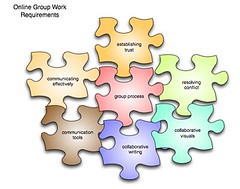There are a couple of events coming up that might interest you.
Weblogger’s Salon — UBC’s Bloggers Sound Off
Date: Thursday, February 15, 2007 – 1:30 – 3:30pm
Location: Telestudios Main Theatre, Lower Level, 2329 West Mall, Rm. #0110
http://www.telestudios.ubc.ca
The simplicity and flexibility of weblog systems has led to an explosion of popularity in all domains, including education. The dramatic growth in the ranks of UBC bloggers across the university is undeniable. But have the shiny tools fundamentally changed educational practice? Do weblogs and other social software tools truly provide a superior means of publishing information and communicating with a community? What happens when students are given meaningful control over their online environments? What are the drawbacks or dangers of this approach? What can technology units do to provide the support that bloggers really need?
As a special event leading up to the Northern Voice weblog conference, some of UBC’s most innovative and accomplished webloggers will lead a discussion of these and other critical issues. For those who can stay after the discussion, convenor Brian Lamb will run through a series of lightning demos of tools and tricks that are indispensable for the educational blogger.
Facilitators:
E. Wayne Ross: Professor, Department of Curriculum Studies – http://ewaynesworld.notlong.com
Jon Beasley-Murray: Assistant Professor, French, Hispanic & Italian Studies – http://posthegemony.org
Eugene Barsky: Physiotherapy Outreach Librarian, Irving K. Barber Learning Centre – http://weblogs.elearning.ubc.ca/physio/
Register through TAG
Scholarship in the Digital Age: Author Rights, Copyright, and Emerging Changes in the Scholarly Communication System
Facilitator: Joy Kirchner and Hilde Colenbrander, UBC Library
Date: February 22, 2007
Time: 9:30am – Noon
Location: TAG Meeting Room, Basement of David Lam Bldg., 6326 Agricultural Road
This session will describe what authors are permitted to do with their scholarship in the digital arena, emerging developments in digital rights management, new developments in the sharing and storing of scholarly works and building momentum worldwide to change the current system of scholarly communication to a more open, less restrictive model.
The Presenters are interested in hearing beforehand any specific questions or specific areas of interest you might have about these issues so that they might integrate these into the workshop. Send questions or comments to Joy Kirchner
Register through TAG

